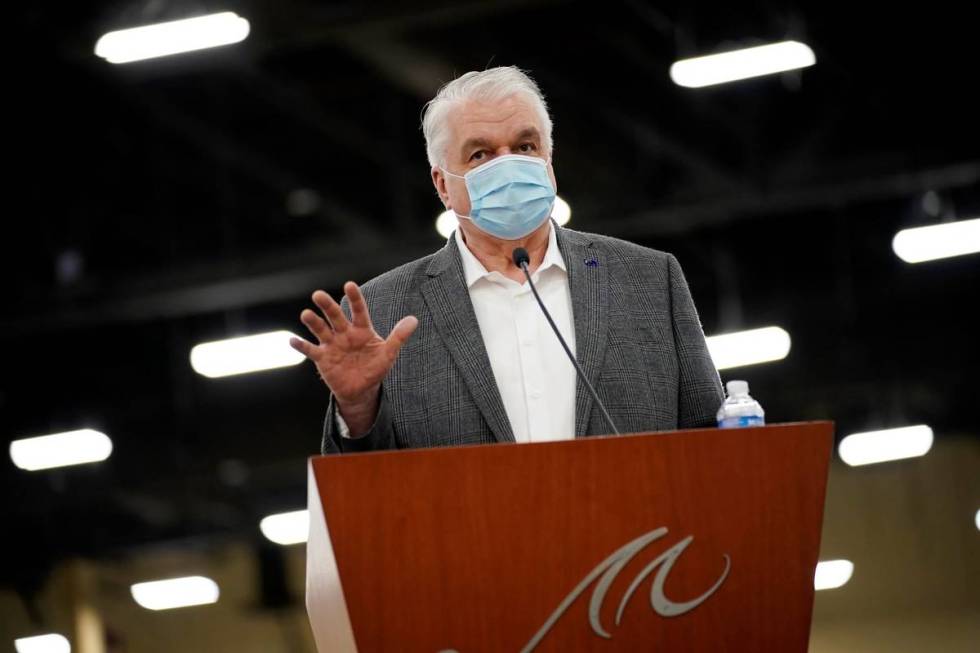Economic Forum: Nevada has $586M more to spend

CARSON CITY — Nevada’s remarkable rebound from the worst of the pandemic’s economic impacts was confirmed Tuesday with a revised economic forecast that gives the state over half a billion dollars more than expected over the next two years.
The state Economic Forum on Tuesday determined that state tax revenues for the next two years will be significantly higher than the forecasts from December, to the tune of an extra $586 million to spend — thanks in no small part to a robust rollout of COVID-19 vaccines and a wave of federal stimulus money.
The boost means that Nevada lawmakers working to finalize the state’s next two-year budget will have nearly $9.1 billion to work with, a welcome boon given previous grim projections that showed the state’s budget being pinched by the pandemic fallout for several years. That’s about $400 million more than the budget that Gov. Steve Sisolak proposed in January.
“The increase in revenue projections announced today along with the funding the State will be receiving from the American Rescue Plan will put us in a better position to begin stabilizing the State’s fiscal situation, restoring critical services and getting assistance to Nevadans most in need,” the governor said in a statement.
The state expects to receive an additional $2.9 billion from the federal government’s American Rescue Plan.
“We must always remember the struggles we faced during the last year, and vow to use this opportunity to ensure we are never in that vulnerable position again,” Sisolak added. “That means making strategic decisions through the lens of responsible fiscal management focused on transforming our State for future generations and developing a solid economic foundation that leaves no Nevadan behind.”
Welcome news
Daniel White, director of public sector research for Moody’s Analytics, said during Tuesday’s meeting that the latest projections for the state’s and the nation’s recovery are “night and day” compared with the predictions made last fall.
During meetings at that time, the forum predicted it could take until the end of calendar year 2022 before the economy fully bounced back and reopened. White said that the nation’s faster-than-expected distribution and availability of vaccines has accelerated the forecasts for that mark and now it could happen this summer.
White also attributed the rosier outlooks to political changes on the national level.
Joe Biden winning the presidency coupled with Democrats taking control of the U.S. Senate, White said, “totally changed the calculus in terms of the additional amount of federal spending that would come.”
Revenue from sales tax saw the biggest projected bump and is expected to generate an additional $197 million over the two-year period compared with the panel’s December forecast.
Gaming revenue was one sector that most experts had predicted would not come until much further along the recovery timeline, similar to how it lagged behind in the recovery after the Great Recession.
But with wider availability of vaccines, decreased infection rates and subsequent relaxing of capacity restrictions, along with the federal stimulus money, forecasters have higher hopes that gambling, and tourism in general, can bounce back for Southern Nevada much faster.
Michael Lawton, an analyst with the Nevada Gaming Control Board, pointed to the recent higher-than-expected gambling revenue that the state has seen as evidence for the improved outlook for one of the key cogs in the state’s economic machine.
March gaming wins were the highest seen in eight years and proved to be all-time records for some areas, including downtown Las Vegas. And April, Lawton added, looks as though it also performed above pre-pandemic levels.
“Our intel tells us that the demand and the stimulus have not worn off,” Lawton said.
Spending the windfall
With the final budget number set, the focus in Carson City now turns to where lawmakers will spend the newfound cash.
Sisolak proposed a general fund budget of nearly $8.7 billion in January. His budget was not as constrained as many expected it could be, but it still included reductions in several areas, including education and health care.
Assembly Minority Leader Robin Titus, R-Wellington, said lawmakers should look first at restoring those cuts.
“We must immediately review the Governor’s budget cuts and restore funding to critical areas in education, healthcare, and infrastructure. Additionally, we need to encourage consumer confidence and help businesses get back to where they were prior to the pandemic,” Titus said in a statement.
Assembly Speaker Jason Frierson, D-Las Vegas, had been in committees Tuesday afternoon and had not had a chance to review the forum’s revised projections. But the Democratic leader said “it doesn’t really change much in our minds.”
Frierson noted the cuts made to the budget last summer during the special sessions as lawmakers worked to fill a $1.2 billion hole blown in the budget by the pandemic and related economic shutdown. He agreed with his Republican counterpart that addressing those cuts should be top priority.
“We welcome the news. I think it’s indicative that the governor’s done it right by making sure that we are responsible in how we open back up and I think the economy coming back, and those numbers I think confirm that we’re doing the right thing.”
Contact Capital Bureau Chief Colton Lochhead at clochhead@reviewjournal.com. Follow @ColtonLochhead on Twitter.